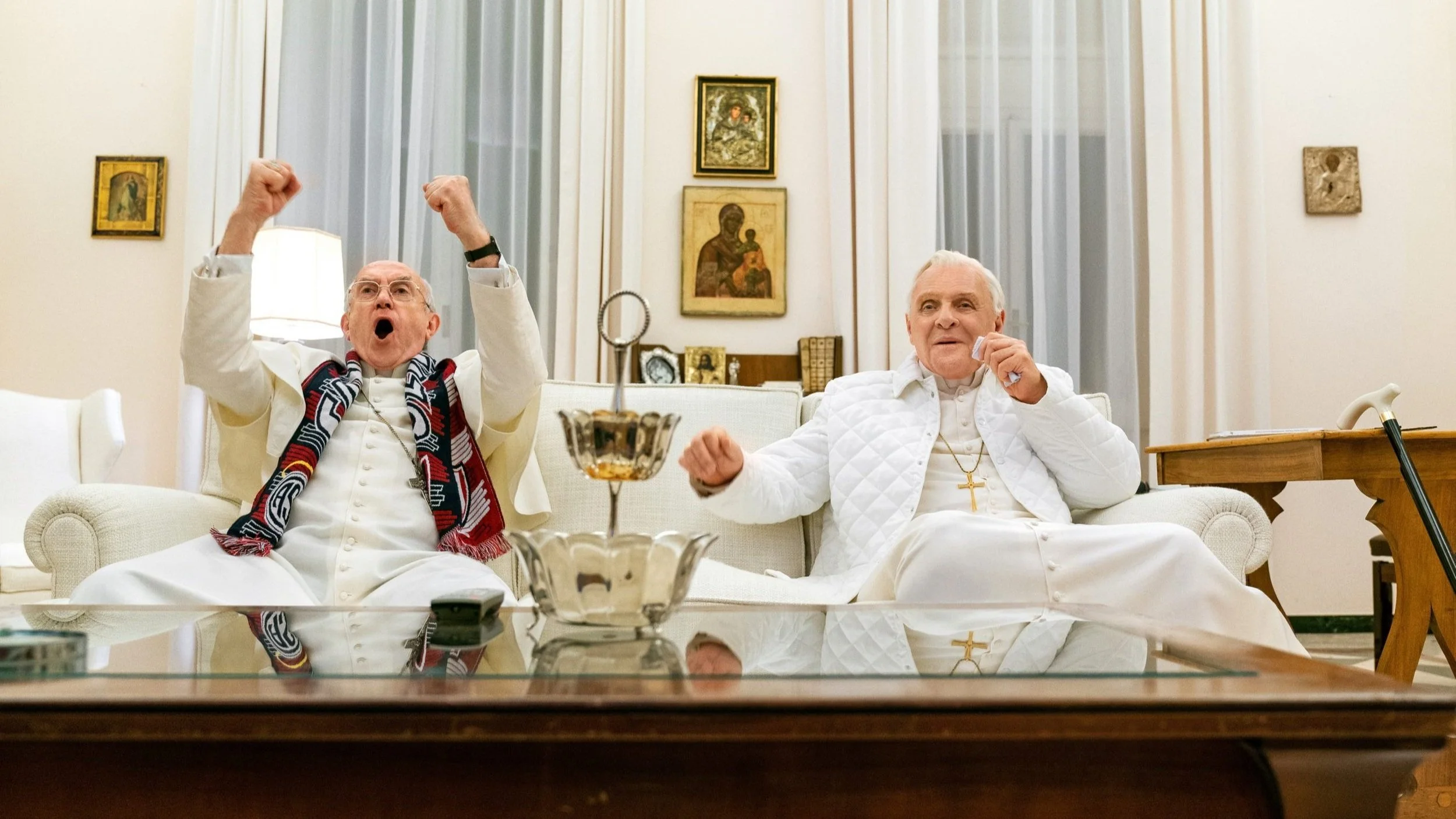The Two Popes
A chance to admire some fine acting and to puzzle over the film that provides it.
Jonathan Pryce and Anthony Hopkins
As one would expect from a film starring Anthony Hopkins and Jonathan Pryce, The Two Popes is very well acted, but it is also a very strange piece - and that for several reasons. For one thing, despite a writing credit which suggests that it is a screen original, it plays like a film version of a stage play. That's because the greater part of this two hours plus movie consists of a series of conversations between the titular characters, Pope Benedict XVI and the man who would eventually become his successor, Cardinal Jorge Bergoglio. There are flashbacks, but even the most significant of them relating to events in Buenos Aires in 1975 during the notorious disappearances is interrupted at intervals by shots cutting back to the two men talking.
Another question that quickly arises concerns the tone of the film. The very opening (later repeated) finds humour in a Pope trying in vain to book an airline ticket and after that, following a jokey reference to Abba, a scene featuring the Papal Conclave which elected Pope Benedict in 2005 is accompanied by the strains of 'Dancing Queen' on the soundtrack. Later on, our central duo get food brought in to them at the Vatican but only settle down to eat this meal of pizza accompanied by a drink of Fanta after it has been given a blessing by Benedict. So is this movie - yet another one 'inspired by true events' - a comedy or even a satire? Hardly. The first half is at pains to show the two central characters as opposites: Benedict a man of strictly traditional views who abhors most of Bergoglio's liberal ideas of what Christianity should stand for today.
Yet if the essence of the first half lies in questioning how far the Catholic Church can and should change with the times (even inadequate responses to paedophilia in the priesthood are touched on here), the second half of The Two Popes veers off in other directions. By then, although little time has passed to explain it, Benedict's attitude to the Cardinal has altered and the theme that now emerges appears to be the human fallibility of churchmen. Both the Pope and the Cardinal make confession to each other, a development which cuts across any earlier assumption that the viewer is expected to see the Cardinal as a clear-cut and uncomplicated hero while deploring everything for which Benedict stands. But, if the Cardinal's remorse over the extent of his collaboration with the authorities in Buenos Aires (the subject of that key flashback) is suitably detailed, Benedict's mea culpa is less distinct - indeed his crucial words are obliterated on the soundtrack in a moment of stylisation, something that is all of a piece with the distracting shifts in screen size that are as inconsistent as the mixture of colour and black and white for the images contained in the flashbacks.
By the close we have moved forward in time to see that Cardinal Bergoglio has become Pope Francis. Yet even now the oddities persist in that a big speech by the new Pope, an indictment of all of us over such matters as how immigrants are being treated, is put to one side so that the film can end with our two leading characters watching a football match together. Rarely has a film seemed so all over the place, but even that fact in itself prevents it from being boring, and there is always the acting. Hopkins make the most of what he has with the best moments coming late on, but it is Pryce in the better-written role who commands the film in a beautifully judged performance.
MANSEL STIMPSON
Cast: Anthony Hopkins, Jonathan Pryce, Juan Minujín, Sidney Cole, Thomas D. Williams, Federico Torre, Pablo Trimaríchi.
Dir Fernando Meirelles, Pro Jonathan Eirich, Dan Lin and Tracey Seaward, Screenplay Anthony McCarten, Ph César Charlone, Pro Des Mark Tildesley, Ed Fernando Stutz, Music Bruce Dessner, Costumes Luca Canfora.
Netflix-Netflix.
125 mins. UK/Italy/Argentina/USA. 2019. Rel: 29 November 2019. Cert. 12A.


